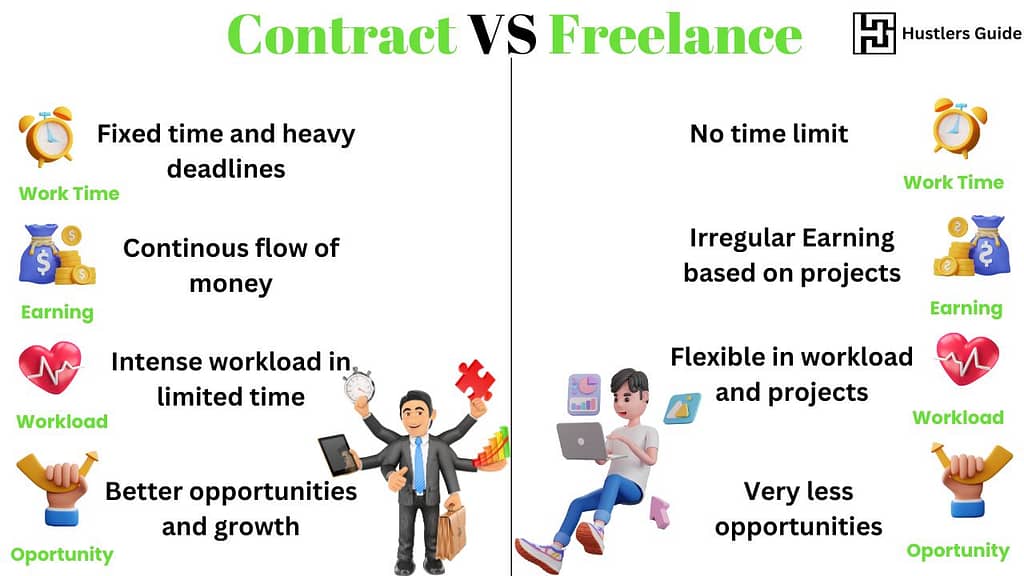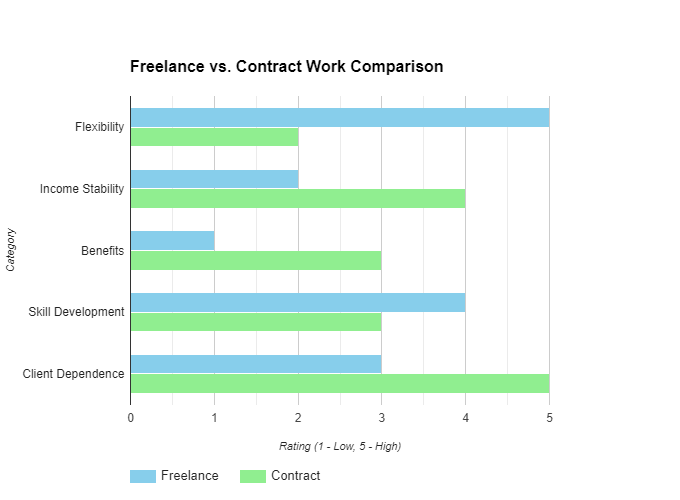
The world is shifting towards online platforms for jobs. When talking about online jobs, the first thing you think about is freelancing, right? Well, there is something more than Freelancing, i.e., Contract. The lines between freelancing and contracting can often blur, leading to confusion about the two work arrangements.
While both offer flexibility and independence, they differ significantly in terms of duration, scope, and responsibilities. Understanding the benefits and drawbacks of each can help you make a better selection, but trust me, you can handle both too!
What is Freelancing?
Freelancing is more of a business that you own, and you’re in charge of everything. A freelancer is self-employed and works independently, taking on various projects from multiple clients, both national and international. Just because Freelancer is their own boss, they have complete control over their workload, rates, and working hours.
Benefits of Freelancing
- Flexibility: Freelancers enjoy unparalleled flexibility in choosing projects, setting their own hours, and working remotely. This autonomy allows for better work-life balance. The flexibility is not only in hours but also in skills. The most popular freelancing industries include IT, writing, and design, reflecting the increasing demand for digital skills.
- Diverse Skill Development: The freelance workforce has been steadily growing in recent years, driven by factors like technological advancements and the gig economy. Working on multiple projects for different clients exposes freelancers to a wide range of challenges and opportunities, fostering continuous skill development.
- Entrepreneurial Mindset: Freelancing cultivates an entrepreneurial spirit as individuals take ownership of their business, from client acquisition to financial management. Research indicates that freelancers and contractors often report higher levels of job satisfaction compared to traditional employees.
- Potential for High Earnings: While freelance income can vary widely, some studies suggest that successful freelancers can earn significantly more than traditional employees. Successful freelancers can command premium rates, leading to potentially higher income compared to traditional employment.
Drawbacks of Freelancing
- Income Instability: Although you are the boss, but it doesn’t mean that you’ll bath in dollars. Freelance work can be inconsistent, with income fluctuating based on project availability. This can lead to financial uncertainty.
- Lack of Benefits: Freelancers typically don’t receive benefits like health insurance, paid time off, or retirement contributions, requiring self-provision. But once your business takes off, you won’t bother paying for such services.
- Isolation: Working independently can lead to feelings of isolation and lack of social interaction, especially for introverted individuals. It also affects professional grooming and a lack of professionalism.
- Administrative Burden: Freelancers are responsible for handling their own taxes, invoicing, and business operations, which can be time-consuming. It’s not a big flaw, but at a large scale, this can cause a serious mess.
If you are a Fresher and want to start Freelancing, my blog will help a lot. check out How To Start Freelancing With No Experience?

What is Contract
As the name suggests, the contract is based on some conditions and a certain period for a task. A contractor is typically hired for a specific project or period, working exclusively for one client. They often have more defined roles and responsibilities compared to freelancers.
Benefits of Contract
- Stability: Unlike freelancing, a contract is more stable and secure. Contractors often enjoy more job security than freelancers, as they work on a fixed-term contract with a single client. Sometimes, this stability can last for years, which is lacking in freelancing. Most of the time, Contract work is often concentrated in skill-intensive areas where specialized expertise is required for specific projects.
- Potential for Benefits: Depending on the contract, contractors might receive benefits like health insurance or paid time off, similar to traditional employees. You can call it like a job but for a certain period. Contract hiring often serves as a leading indicator of economic health. When businesses are expanding, they tend to increase contract hiring before adding permanent employees.
- Clear Expectations: Contract roles typically have well-defined expectations and responsibilities, reducing ambiguity. On the contrary, freelancing has a lot of chances for variations, cancellations and change of requirements.
- Opportunity for Growth: Successful contractors can build strong relationships with clients, leading to long-term partnerships and career advancement. Whereas in freelancing, once you’re done with a client, it’s pretty rare for that client to become permanent or contact you again. Moreover, Industries with a high prevalence of project-based work, such as IT, engineering, and consulting, might have more data on contract worker utilization.
Drawbacks of Contracting
- Limited Flexibility: Contractors have less flexibility in terms of working hours and project choices compared to freelancers since you’re not the boss.
- Dependence on One Client: Relying on a single client for income can be risky if the contract is terminated prematurely, which happens very often.
- Potential for Overwork: Contract roles often demand full-time commitment, leading to work-life balance challenges.
- Limited Skill Development: Focusing on a single client or project might restrict skill development opportunities compared to freelancing.
Which One to Choose in Freelance VS Contract
The decision to pursue freelancing or contracting merely depends on your preferences, career goals, and risk tolerance. I think both models offer unique advantages and challenges, but let’s take a closer look.
Freelancing provides unparalleled flexibility. You’re your own boss, setting your hours, choosing projects, and determining your rates.
This autonomy can be incredibly rewarding, allowing for a better work-life balance and the opportunity to work on diverse projects. Freelancing also fosters entrepreneurial skills as you manage your business independently.
Contracting offers a more structured approach, often with a fixed-term agreement and a single client. This can provide a sense of stability and security, especially compared to the potential income fluctuations of freelancing. Depending on the contract, you might also receive benefits similar to those of traditional employees.
The Best of Both Worlds Approach
Why not go with both models? Many successful professionals combine elements of freelancing and contracting. By managing a small-scale operation, you can enjoy the benefits of both models.
For instance, you might have a core contract that provides a steady income while taking on freelance projects to supplement your earnings and diversify your skill set. How’s this?

Remember: Both freelancing and contracting have their merits and drawbacks. The key to success lies in understanding your priorities, building a strong professional network, and effectively managing your finances.
To know the success rate and earnings of a freelancer, check out The Truth About Freelancer Earnings: How Much Can You Expect To Make?
Conclusion
The choice in Freelance VS Contract is merely yours. You will find millions of success stories in both cases. I would suggest, if you have potential, go with both approaches. Many professionals find success by combining elements of both models, creating a hybrid approach that leverages the strengths of each.
In the end, the key to success in either model lies in understanding your priorities, building a strong professional network, and effectively managing your finances.
By carefully considering your options and developing a well-rounded skill set, you can increase your chances of thriving in the dynamic world of freelance and contract work.







